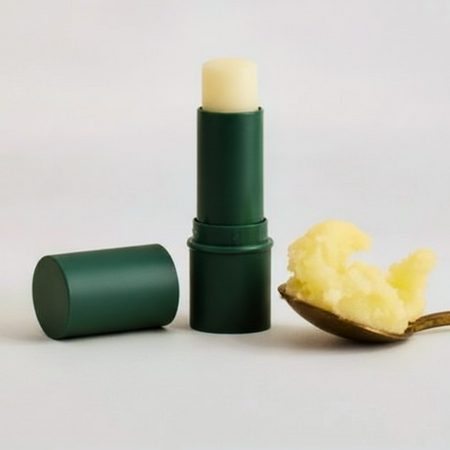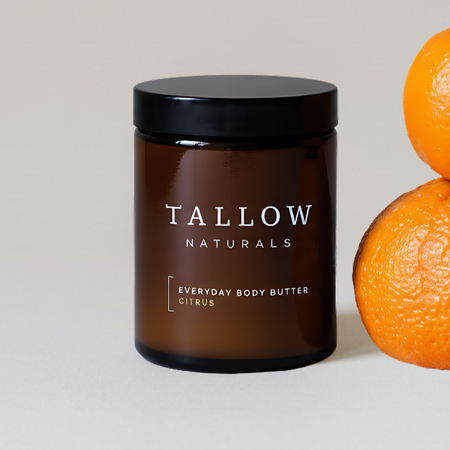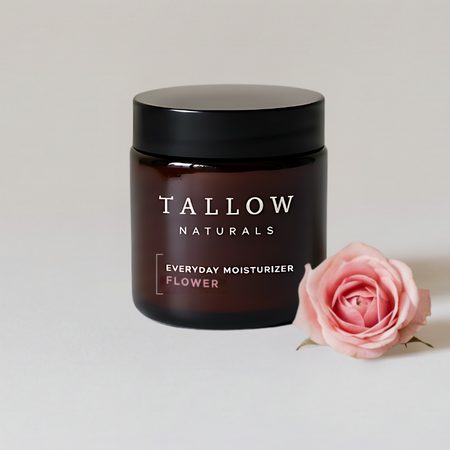Superfood  for your skin
for your skin
Ingredients
This is what makes beef tallow a miracle ingredient in skincare
Tallow, purified beef tallow, is one of the most skin-compatible ingredients out there. Not a trendy ingredient, not an exotic extract, but an age-old remedy that simply works.
-
Skin-identical lipids
Tallow contains fatty acids such as stearic acid and palmitic acid, which are found in almost identical form in our natural skin barrier.
-
Fat-soluble vitamins
Tallow provides important vitamins such as A, D, E, and K. These nutrients help your skin stay resilient, supple, and radiant.
-
Good tolerability
Because of tallow’s skin-like structure, it is generally very well tolerated. Even sensitive skin benefits from its gentle, soothing effect.
-
Sustainable and transparent
Our tallow comes from certified organic farms in the Lake Constance region. Short supply chains, transparency, and the meaningful use of natural raw materials make our care products sustainable.
scientific facts
-
Skin barrier function
“Up to 60% of the skin barrier consists of lipids—and beef tallow almost exactly mimics these.”
Source: Elias PM. “Stratum corneum lipids serve as the skin’s primary barrier to water loss and environmental insults.” (J Invest Dermatol, 2005) -
Saturated fatty acids reduce moisture loss
“Stearic acid and palmitic acid, which are abundant in beef tallow, help reduce transepidermal water loss (TEWL) by forming a protective lipid layer.”
Rawlings AV, Harding CR. “Moisturization and skin barrier function.” (Dermatol Ther, 2004 -
Beef tallow contains cholesterol—important for repairing the skin barrier
"Cholesterol is crucial for restoring the skin barrier—and beef tallow contains it naturally."
Elias PM et al. “Essential role of lipids in maintaining epidermal barrier.” (Am J Clin Dermatol, 2003) -
The lipids in beef tallow are identical to those in skin
“The fatty acid profile of beef tallow closely matches that of human sebum—making it very well tolerated and not disruptive to the skin’s microbiome.”
Lipids of the sebaceous glands and stratum corneum.” (J Lipid Res, 1992) -
Vitamin E protects against UV damage
"Topical vitamin E (contained in beef tallow) can reduce skin damage and inflammation caused by UVB radiation."
Thiele JJ et al. “Vitamin E: critical review of its roles in skin biology.” (Free Radic Biol Med, 1998) -
Vitamin A (retinyl palmitate) supports collagen production and skin renewal
“Retinyl palmitate, a natural form of vitamin A in beef tallow, supports cell renewal and collagen production.”
Kafi R et al. “Improvement of naturally aged skin with topical retinol.” (Arch Dermatol, 2007) -
Omega-3 fatty acids and CLA help reduce inflammation
“Tallow from grass-fed animals contains omega-3 fatty acids and CLA—known to reduce irritation and support skin homeostasis.”
Source: Bhattacharya A et al. “Biological effects of conjugated linoleic acids.” (J Nutr Biochem, 2006) -
Glycerin is a natural moisturizer
"Beef tallow can contain small amounts of natural glycerin—a powerful moisturizer that draws moisture into the skin."
Lodén M. “Role of moisturizers in barrier recovery.” (Dermatol Ther, 2008)

more vitamins for you
Studies show that the fat from grass-fed cattle contains 3 to 4 times more vitamins A and E, up to 5 times more omega-3 fatty acids, and 2 to 4 times more CLA than that from grain-fed cattle. This makes it not only more ethically sourced, but also significantly richer in nutrients for your skin.













